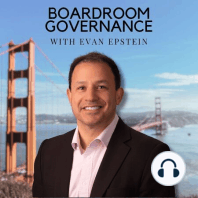64 min listen

Bill McNabb: Talent, Strategy and Risk. How Investors and Boards Are Redefining TSR.
Bill McNabb: Talent, Strategy and Risk. How Investors and Boards Are Redefining TSR.
ratings:
Length:
76 minutes
Released:
Nov 28, 2022
Format:
Podcast episode
Description
0:00 -- Intro.2:21 -- Start of interview.3:14 -- Bill's "origin story". 6:57 -- On why he joined Vanguard in 1986, and what makes the company so special. "Intellectual rigor of Wall Street with mid-western values."10:30 -- On Bill's board career. He first joined the Philadelphia Zoo (he stepped down this summer after 16 years) and currently serves on the boards of UnitedHealthcare Group and IBM, plus other PE and VC-backed companies and non-profit boards. The connection between public and private boards.13:03 -- On his book Talent, Strategy, Risk: How Investors and Boards Are Redefining TSR and what made him write it. The early governance stewardship by Vanguard (Jack Brennan's letter to 450 CEOs in 2002 laying out Vanguard's governance expectations on governance matters). The Common Sense Governance Principles (2016). His work with the Raj & Kamla Gupta Governance Institute at Drexel University, where he met his co-authors Ram Charan and Dennis Carey.17:13 -- On shareholder engagement and why directors should understand their investor base. Traditionally, the only times there would be shareholder engagement was when an activist would get involved (and how their role has evolved), and with say-on-pay. The role of permanent capital (index funds).21:21 -- Why some of the best-run public companies operate with a private company mindset. Some advantages of private equity boards.26:51 -- His take on dual-class stock structures. The good and the bad. "But making them permanent is a mistake."29:30 -- The focus on Talent, Strategy and Risk (TSR) in his book:(30:06) How to think about Talent.(31:58) How to think about Strategy. "Being agile around strategy is really important"(35:20) How to think about Risk. Example of cybersecurity.38:46 -- On creating a capable board: board composition and expertise. "Having a couple of former CEOs serve on a board is very valuable.""You've got to push back on the over reliance of expertise, for an example, if you have a cyber expert who only knows about cyber, they will not add much more value to the board.""Having some domain expertise in the particular business area of the company is very important."45:59 -- On the work and focus of board committees: "Talent, Comp and Execution Committee" & "Strategy and Risk Committee."48:43 -- On the rise of Chief Human Resources Officers (CHROs). Talent and culture is critical. It has become a strategic function more than just an administrative function.52:14 -- On how to reduce the information asymmetry between management and the board. The Netflix case study by Larcker & Tayan (2018). "This is where having a couple of domain experts on your board is important because they can at least open some doors and give ideas to pursue." You need to be creative and bring in experts to present to the board (example: cybersecurity, geopolitics, activists, buy-side analysts, venture-capitalists, etc).56:52 -- On the new trend of large institutional investors delegating voting power to beneficial owners. "If you delegate to sovereign wealth funds or large pension funds who have staffs that can vote in a thoughtful way I see no problem with that. But the problem is delegating to individual investors (99.9% will not vote and the proxy advisors will determine how this is all done [and I don't think they do a great job.]" "I'm glad that Vanguard does the voting with its long-term value creation approach."01:01:28 -- His take on ESG, and the distinction between shareholder and stakeholder value. The pushback from governments failing on some large macro issues, asset managers seeking new fees, and its politization. "ESG is just a subset of the shareholder and stakeholder debate." The 'E' in ESG is the most complicated because it is so tied to these very specific climate goals. I think that this is a reaction to the fact that governments have not been able to come to any agreement on some of these issues, and I'm skeptical that companies can achieve some of these goals. It's
Released:
Nov 28, 2022
Format:
Podcast episode
Titles in the series (100)
Suzanne Vautrinot: From the Military to the Corporate Boardroom, with a Focus on Cybersecurity.: In this episode, I talk with Suzanne Vautrinot, President of Kilovolt Consulting, a cyber security strategy and technology consulting firm, and a member of the board of directors of CSX Corporation (NASDAQ:CSX), Ecolab (NYSE: ECL), Parsons Corporation (NYSE: PSN), the Battelle Memorial Institute and Wells Fargo (NYSE: WFC). Suzanne retired from the United States Air Force in October 2013 after 31 years of distinguished service, including as Major General and Commander, 24th Air Force, Air Forces Cyber and Air Force Network Operations where she oversaw a multi-billion dollar cyber enterprise responsible for operating, extending, maintaining, and defending the Air Force portion of the Department of Defense global network. She has been awarded numerous medals and commendations, including the Defense Superior Service Medal and Distinguished Service Medal. We focus this discussion on her lea by Boardroom Governance with Evan Epstein